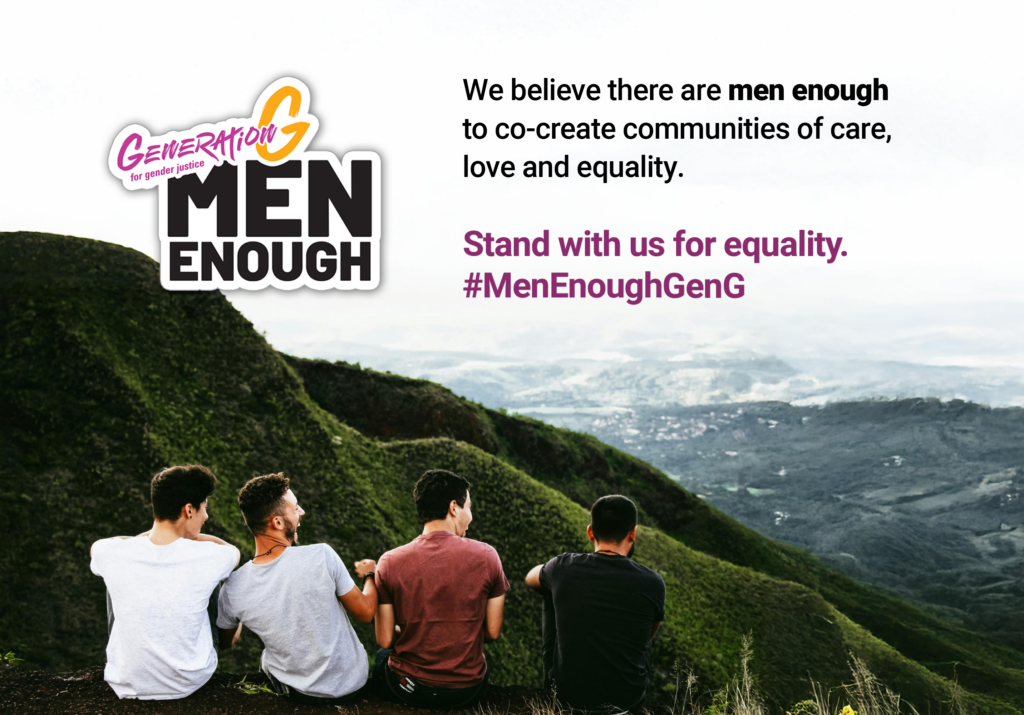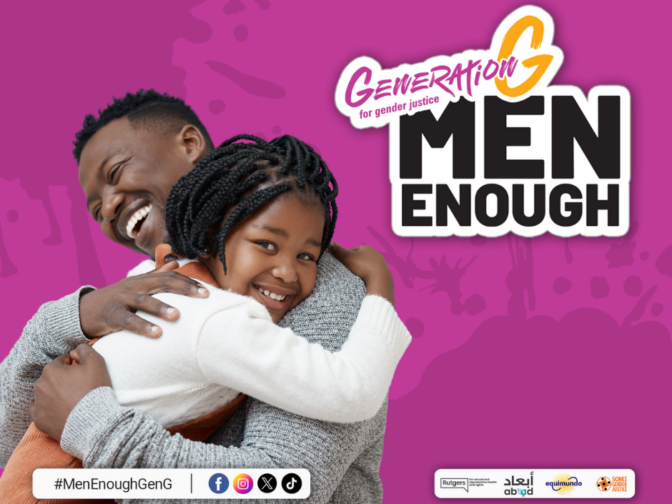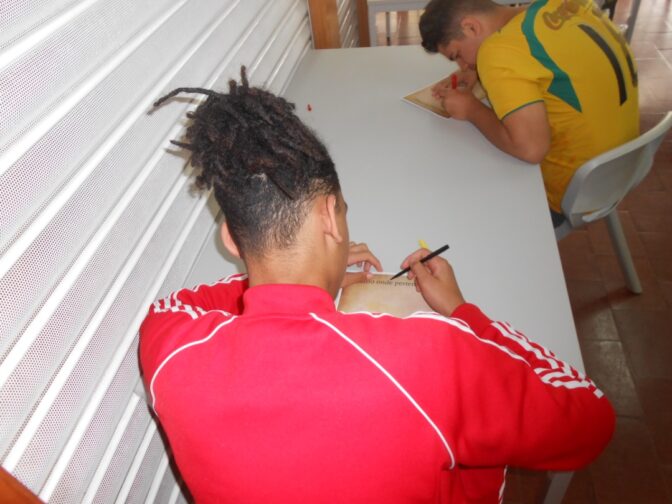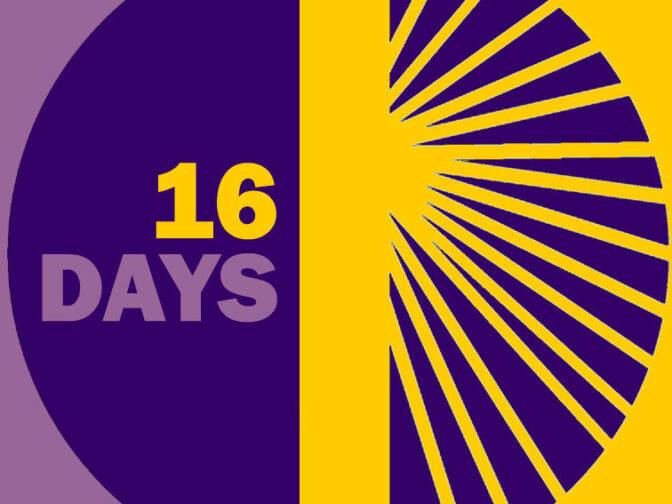Take a moment and imagine a world that is free from violence. A world where babies are born into equal opportunities. A world where gender equality is the norm rather than the exception. This is the world that the Generation Gender (Gen G) partnership is working to create with programming, advocacy, and campaigns.
Campaign at a Glance
Gen G’s work over the past three years seeks to build on the over 46 million people reached so far via online and offline campaigns on gender justice, gender-based violence, and equal division of care. To amplify this message, the organizations at the core of Gen G have decided to create a campaign they have named ‘The Men Enough Campaign’. At the heart of it is a strong rejection of simplistic and harmful definitions of masculinity that prioritize toughness, stoicism, and control. Men are more than these 2-dimensional sketches. Instead, the campaign encourages men and boys to reflect on their beliefs, attitudes, and actions and develop more diverse, positive, and inclusive forms of expressing themselves.
The campaign directly challenges the everyday phrase “are you man enough,” turning it from a stereotypical demand to prove oneself as “manly,” into a rallying call that men are already enough. Men who embrace attributes of compassion, empathy, and equality allow themselves to experience the fullness and joy of being human and open themselves up to receiving the care and compassion we all need to survive.
In November and December 2024, partner coalitions in Morocco, Rwanda, South Africa, and Uganda will launch their own campaigns based on the findings of recent local research. These activities will range from social media engagements to dialogues, community outreach, and media appearances. All activities will be underpinned by messaging on themes such as men’s mental health, equality in relationships, and sharing unpaid care work such as childcare and domestic work. Campaigns will show that there are men who believe and practice gender equality to create meaningful change and will adapt messaging for each theme, using actions like Men Enough…to Love, Men Enough…to Seek Help, and Men Enough…to End Violence.
Audience
Men aged 18-35 will be the primary audience, and there will also be strategic engagement with religious and traditional leaders, policymakers, and the media. For some readers, one of the first questions that comes to mind is “Why target men?”
Men have the ability and responsibility to significantly contribute to creating more equal and safe homes, schools, workplaces, and communities for the benefit of everyone. However, in the past few decades, particularly with the advent of social media and the amplification of extreme content, the portrayal of what it means “to be a man” has increasingly focused on harmful stereotypes, including ones based on aggression and dominance, posing challenges to gender equality. Men often face pressure to fit within society’s expectations, leading them to hide their emotions, struggle in relationships, and feel trapped by strict, unrealistic ideals of masculinity. Men who show emotional vulnerability, express kindness, or reject high-risk behaviors are often isolated, labeled as weak, or attacked with derogatory statements.
Join the Movement
This effort aims to play its part in opposing restrictive definitions of masculinity in the countries where it will be implemented. It’s time to challenge these harmful and outdated notions of what men should and shouldn’t do, look, and be. It’s time to reflect on relationships with women and with other men, and celebrate men who love, care, and share responsibilities. While the majority of campaign activities will be driven by partner coalitions and held in-country, we encourage you to participate wherever you are. By acting in simple yet powerful ways, you can support the campaign’s goal of promoting more positive masculinities and a gender-equal world. Here’s how:
- Follow and engage online: Join the conversation using the hashtag #MenEnoughGenG. By liking, sharing, and commenting on posts as an individual or organization, you will help spread the word and encourage others to take a similar stand.
- Share your story: Real change is often triggered when people speak up and share their lived experiences. Draft a social media post or record a short video, add #MenEnoughGenG, and show how you’re championing positive masculinity and equality at home, at work, and in your community.
- Attend or volunteer for local and online events: If you are in Morocco, Rwanda, South Africa, or Uganda, follow the campaign (social media profiles below) and keep an eye out for in-person activities near you. These gatherings provide opportunities to learn, discuss, and connect with others who share your commitment. For those outside these countries or preferring virtual engagement, the campaign’s social media profiles will also provide details of online events, such as webinars.
- Reflect on your relationships: Take time to examine your actions and relationships. One of the first steps would be starting a conversation with your spouse, family, and friends about gender roles and expectations. Ask them about what “being a man” means to them. Are there any frustrating social expectations? What role do they think men should play in caring for themselves and others? These conversations can spark awareness and encourage you to consider the impact of gender roles and expectations in daily life.
Remember that the seemingly small efforts of many men can lead to powerful change. Every story, every conversation, and every action counts.
Whether it’s offering support to a friend, sharing responsibilities at home, or speaking up against harmful stereotypes, each choice we make helps redefine our own and others’ understanding of masculinity for the better. This campaign challenges you to help redefine masculinity—to be part of the change.
Follow and engage with #MenEnoughGenG on these social media accounts and profiles:
Global: Equimundo Instagram, Equimundo X, ABAAD Instagram, ABAAD X
Morocco: Facebook, Instagram
Rwanda: Instagram, X
South Africa: Instagram, X
Uganda: X, Instagram, TikTok
About Generation Gender (Gen G)
Since 2021, the Gen G partnership, funded by the Dutch Ministry of Foreign Affairs and globally coordinated by four organizations, has sought to galvanize and equip young people to address the root causes of gender inequality and foster meaningful change. Rutgers, Equimundo, ABAAD, and Sonke Gender Justice work towards this vision in collaboration with 19 local civil society organizations that form country coalitions in Jordan, Lebanon, Indonesia, Morocco, Rwanda, South Africa, and Uganda.




